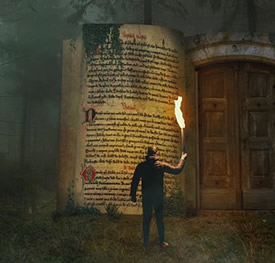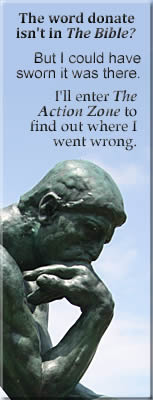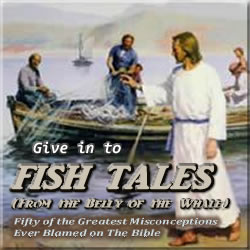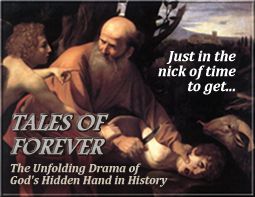A Case for The Promise of America
Exhibit “A”
Its Themes
THE PROMISE OF AMERICA
Theme #1: God has never stopped viewing the Earth as being laid out in accordance with the destiny of the Children of Israel.
When the Most High divided their inheritance to the nations, and when He separated the sons of Adam, He set the boundaries of the peoples according to the number of the Children of Israel.
According to The Book of Deuteronomy, God divided the world so that even before the sons of Adam began to multiply across the face of the Earth, the boundaries of humanity were already set according to the number of the Children of Israel.
OF GOD’S EXPANDING EMPIRE
Theme #2: Nothing in Scripture teaches that we should treat the Earth as though it were nothing more than the devil’s domain.
Jesus’ reference to His Kingdom not being “of this world” doesn’t mean this world is entirely evil just because Adam’s descendants continue as prisoners of death, Hell, and the grave until the consummation of the ages. For anyone who cares to notice, in contrasting His Kingdom with this world, Jesus didn’t say the Earth itself was unworthy or ungodly; He simply stated that His Kingdom wasn’t “of this world.” The Greek word that Jesus used for “world” is cosmos, which doesn’t speak of the Earth and all its fullness per se but, rather, of a world system, as in, a world philosophy or ideology.
Chapter One — A FIRM FOUNDATION
Theme #3: God’s word reveals a clear pattern of His truth being given to humanity, of that knowledge being lost, then of it being found again after a “set time” of punishment has expired.
This pattern of “lostness” is one where God bestows His wisdom through His chosen messengers, but because of complacency and pride that message is, over time, taken for granted and marginalized, so God removes that knowledge from the Earth as a wakeup call.
Then after a specified period of time has run its course, which usually corresponds to the time humanity had been gifted with that wisdom, there’s a time of rediscovery and reawakening, with the next group being afforded the opportunity to succeed where the previous group failed.
Theme #4: The dramatic narratives of The Bible reveal a truth far more potent than the typical view of Scripture as being a mere guide to right and wrong modes of human behavior.
According to biblical typology, the stories of the patriarchs don’t just record the lives of folks who encountered God and who had various reactions to those encounters.
Instead, when we look at the whole record of Scripture, we see how God entered into the very lives of these people to weave a tapestry for the sake of an onlooking world. In short, Scripture doesn’t just record random stories, here and there; instead, it tells the stories of lesser messianic figures like Enoch, Noah, Abraham, Isaac, Moses, Joshua, and David in such a way that they foreshadow the role that the ultimate messianic person, Jesus Christ, plays in God’s redemptive plan for humanity.
Theme #5: If you read The Bible for yourself, then you can’t help but be struck by certain inconsistencies.
On one hand, these aren’t so much inconsistencies as they are paradoxes, which are there by God’s design and are clear expressions of the paradoxical nature of the Divine. On the other hand, there are many verses in The Bible that after further review constitute genuine inconsistencies and so are really misconceptions of The Bible.
In contrast to a paradox, a misconception is when a traditional reading of Scripture contains an obvious contradiction, and no matter how much we try to reconcile that view with the rest of Scripture, it still can’t be done.
Theme #6: Only when we let the whole of God’s word speak for itself can we finally embrace the truth of Scripture.
That means we should focus less on escaping this “wheel of life,” as is suggested by “otherworldly” philosophies, as though there’s nothing of this life or this Earth worth salvaging. Instead, let’s focus more on dispossessing the personifications of evil who’d rather see God’s magnificent creation turned over to the buzzards and hyenas. Let’s carry on with the work that Jesus’ disciples were charged with when Christ gave them the keys of God’s Kingdom, and in turn were charged with gifting them to us. Let’s take it to heart that God’s Earth and all its fullness is never to be discarded in favor of “greener pastures” over yonder, and remember what God’s word says about the true destiny of God’s nation and the Earth, of which Isaiah, the prophet, spoke: “They won’t hurt or destroy in all My holy mountain: for the Earth will be full of the knowledge of the Lord, as the waters cover the sea.” (Isaiah 11:9)
Story Continues Below
Says Richard Price—the founder and CEO of Academia.edu—on his podcast In Depth With Academia:
On Earth as It is On Heaven: The Promise of America, Technology, and the New Earth is:
To hear Price’s book review of On Earth as It is On Heaven, CLICK HERE.
To watch author and historian W. Kent Smith discuss the contents of his book On Earth as It is On Heaven, at the Sacred Word Revealed Conference ‘23, hosted by Zen Garcia, CLICK BELOW.
Story Continues From Above
Chapter Two — A STILL SMALL VOICE
Theme #7: The most overlooked aspect of how God acts is the way He sometimes acts as though He isn’t God at all.
In the case of Elijah, the arrival of the Lord brought with it a mighty wind, an earthquake, and a fire. Naturally, having just seen God’s fiery power rain down on his burnt offering, Elijah would’ve assumed that all these things might bring him the solution he required. But no, it was the still, small voice that he really needed, although he might never have thought so in his wildest dreams.
Theme #8: Although nations endure while individuals come and go, God is just as concerned with the destiny of individuals as He is of nations.
With Scripture as our reference point, it appears as though, while God is, and always will be, the Lord of the Nations, He understands all too well that nations can’t respond to His still, small voice; or yearn for truth, freedom, and justice; or strive to live according to the rule of law and the liberty of conscience; only individuals can do that. And if that’s true, then, paradoxically, the individuals who comprise the nations are, and always will be, the foundation upon which even the most enduring nation is built.
Chapter Three — OUTSIDERS LOOKING IN
Theme #9: Prior to the Fall of Man, Adam and Eve lived in the same world as God, but after the Fall, both God and man, by divine decree, became outsiders looking in.
Just as Adam and Eve became outsiders of God’s world after the Fall, God likewise became an outsider to their world—and ours—ever since. The implications of this ontological truth have such immense ramifications that the human mind can barely grasp them without a great deal of contemplation and struggle.
Before the Fall, God was bound by a covenant that endued Adam and Eve with the divine presence which enveloped their very being. But after the Fall, God was equally bound by a covenant that revoked all that the divine presence bestowed upon them. That meant not only would disease, pain, and death enter into this new world of theirs, all of God’s promises to them that they would rule and reign over the creation were revoked.
Unless this foundational truth is fully appreciated, we will never be able to understand why God acts the way He does in terms of the ages-long history of human redemption as depicted in Scripture. we’ll never appreciate that from the days of Adam to the Advent of Christ, God has, by His own judicial decree, related to humanity as an outsider, outlier, and alien. This more than anything else explains why God sometimes acts in such godlike manner that no one dares question the divine nature of said actions, while at other times acts so inconspicuously that events can easily be dismissed as though no God at all was necessary for their occurrence.
It also explains why those chosen ones of God were, like Adam before them, the greatest outsiders of human history.
Theme #10: God can transcend any problem this Universe can throw at Him.
In this case, God was faced with the outcome of Adam’s disobedience, which resulted in him and his descendants being doomed to perpetual slavery to the world, the flesh, and the devil. But rather than spell the end of all of God’s hopes for His created ones, God took the very thing with which Satan connived to thwart the divine plan and “turned it inside out,” as it were.
Prior to the Fall, Adam and Eve knew only life and freedom in the Garden, but sadly, because of that peculiar condition, it also meant they were ignorant of the truth of what God warned them about when He said they’d die if they chose knowledge over trust. It was, therefore, only after the Fall that they’d ever learn the difference between the life that God had given them and the life they were confronted with after they forfeited it through their disobedience.
In short, the thing that God required of Adam and Eve was that they trust His word of promise, which they failed to do while yet in the Garden, primarily because, in their state of innocence, they had no way of knowing what disobedience would bring. Only afterward, then, could they begin the real journey of trusting God.
In the end, then, the thing they could never have learned while still happily ensconced in their garden home would only become possible outside of it.
Chapter Four — UNIQUE AMONG NATIONS
Theme #11: The United States of America is unique among nations because no other nation in history has come into being in the same way and under the same circumstances as it did.
No other nation can point to a self-conscious moment in its history where it said: See, this is when we as a people chose a new way of life, a new form of government, conceived in self-determination, and aspiring to liberty and justice for all.
Yet ironically, it’s this very aspect of America’s origins that exposes it to intense criticism concerning its self-avowed aspirations, to morality, equality, and liberty. Because we aspire to worship, to speak, to live as we choose, any failure to live up to such high ideals plays directly into the hands of those who seek to undermine those aspirations. In other words, we’re damned if we do, and damned if we don’t.
What’s more, although America is exposed to such criticism because of its commitment to these values, it’s only vulnerable to such attacks as long as it remains ignorant of its true origins.
Theme #12: The creation of the United States of America didn’t really begin in 1492, or 1620, or 1776, although one may rightly point to all of those dates as marking pivotal years in its creation.
There is actually another worldview concerning America’s origins that completely rewrites the notion that its origins can be traced to 1492, 1620, or 1776.
Much of the evidence that connects the creation of America beyond its assumed origins is something that began to come to light in the mid-1800s, with the birth of the marvelous science of archeology. And then only after much analysis of the archeological evidence, in concert with a new approach to the historical, scientific, and philological evidence, did the truth finally come to light.
Theme #13: While it does seem as though God has taken a vacation concerning the history of nations, He has never checked out in regard to Israel as it relates to His plan to bless the whole world.
The Bible is a metaphor for a divine duality: Just as God both hides and reveals Himself, the message in Scripture reflects this same hiding and revealing—in its various translations throughout the ages—even as it tells the story of those to whom God is hiding and revealing Himself.
In fact, the central drama of The Bible is that of an infinite God Who repeatedly stoops down to interact with finite humans, how those humans respond in awe and reverence with this divine interaction, and how that marvelous relationship is inevitably spoiled by our presumption, pride, and selfishness.
From Adam to Noah, from Jacob’s sons to the Children of Israel, from the Jews in Ezra’s day to those in Jesus’ day, we see an eternal God willingly commune with His mortal ones who then can’t help but turn that willingness to localize His presence into something altogether alien from God’s original plan.
But fortunately, for our sakes, God knows all-too-well about this pattern, and so He’s built into His word not just a description of this tendency but also an antidote for it, if only we’ll pay attention to the clues. Because tucked away in the biblical storyline, from Adam to Christ, there are numerous promises of God—as we’ll soon begin to see—which are more than capable of counteracting any human failures that might threaten God’s ultimate plan for humanity.
Theme #14: The most important promises God has ever made to humanity are those that are unconditional in nature, as they are promises He intends to keep regardless of whether or not the recipients cooperate in their fulfillment..
It is to promises that are unconditional in nature that we’ll concern ourselves in this work—promises like those concerning God’s word to Abraham:
“Leave your country… Go to the land I’ll show you… I’ll make you into a great nation… I’ll make your name great … and everyone on Earth will be blessed through you.”
Chapter Five — THE KINGDOM OF STONE
Theme #15: Despite the repeated failures of Israel’s descendants regarding God’s promise to bless the whole world through them, this never spelled the end of His plan to keep that promise.
Despite every misstep on the part of humanity—and every attempt of Satan to derail this salvation plan—God always had a failsafe plan to right the ship if ever it veered off course. At some point in human history, something—or rather Someone—was scheduled to bridge the gap, in making God’s plan for mankind a reality in spite of all our repeated failures. According to prophecy, this Someone would arrive one day when all hope was lost—the Day of the Lord, it was called—the day when all wrongs would be made right, when the shame of downtrodden Israel would be removed and her rightful place as head of the nations would be established.
So when word spread throughout the countryside, of the Man Jesus Who healed the sick and gave sight to the blind, the dying embers of the old dream began to rekindle. Before long, this Jesus had gathered about Himself a group of eager young men who were all anxious to know more about the hope of Israel. What is it really? Is it a place? Is it a state of mind? Are You the One, Jesus, Who we’ve waited for all this time? Are You the One Who will finally restore this hope of ours, to establish the Kingdom of God, once and for all?
Theme #16: The deepest truths of The Bible are paradoxical in nature.
Ignore this central fact and one is sure to misunderstand everything written in it. Just as importantly, it’s critical to take note of the enormous difference between inconsistencies and paradoxes.
Inconsistencies, as in the case of the previous scene involving the “Lord’s Prayer,” don’t occur because of any contradictions in God’s word itself but, rather, because of human ignorance stemming from a blind adherence to traditions about it.
Paradoxes, on the other hand, stem from the fact that divine truth is not something humans are meant to grasp at first glance. Due to the paradoxical nature of God, the truth of Scripture is something we must wrestle with, live with, struggle with, before we begin to fully embrace what is always hidden in plain sight.
As defined in the dictionary, a paradox is “an apparently contradictory statement that, when investigated or explained, may actually prove to be true.” Notice that in the case of a paradox, what’s initially viewed as a contradiction is nevertheless negated when it’s sufficiently investigated.
As a matter of fact, The Bible is full of apparent contradictions that are usually ignored or go unnoticed, but which, when pointed out, trigger all manner of frustration in the believer, not to mention great delight in the skeptic.
Theme #17: One of the great mysteries of biblical prophecy, the Kingdom of Stone, described by the prophet Daniel, is rarely if ever spoken of in any sermon or commentary..
More often than not, though, if the subject is broached, we’re told that this kingdom represents the Second Coming of Christ. The only problem with that interpretation is this is only possible if you twist Daniel’s method of interpretation. Clearly, Daniel intended his listeners to understand that the imagery of Nebuchadnezzar’s dream of the Great Image represents earthly kingdoms. Nothing at all indicates that the symbolism contained in the dream has shifted, or else why not simply do what Daniel did seven chapters later in his description of four beasts that also represent Babylon, Medo-Persia, Greece, and Rome? There, when Jesus arrived on the scene of biblical prophecy, Daniel plainly stated that One like the Son of Man took His place on the stage of world history.
Imagine what the disciples were thinking, then, when they asked Jesus to teach them to pray. Brutally oppressed by their Roman overlords, the disciples were anxious for Jesus to tell them something that would give them hope in a world where all hope seemed lost. Firmly believing this Man Who healed the sick and tamed the wind could accomplish such an impossibility, the disciples expected Jesus to call them to action at any moment. With yet another command from His lips, the Roman Empire would collapse around them, and the Stone Kingdom they’d heard about their whole lives would finally inaugurate a new era of peace and tranquility upon the Earth.
Undoubtedly, what the disciples were really thinking when they asked Jesus to teach them to pray was: Now that we know Who You are and what You’re capable of, Jesus, what should we do while we patiently wait for You to manifest Your Kingdom of Stone? We see You praying to God above, and as a result, great miracles are wrought by Your hand. So please, as You prepare to crush the kingdoms of the Earth with Your mighty power, can You teach us to pray so we can partake of the miracles You perform among men?
But in response to their veiled request, to learn how to pray, Jesus replied: “So, then, this is how you should pray: ‘Our Father Who is in Heaven, holy is Your name. Your Kingdom come, Your will be done, on Earth as it is in Heaven.’” (Matthew 6:9-10)
One can only imagine the disappointment that the disciples might have felt. Here they were hoping for something that could have helped them in their hour of need, something to lift them out of their downtrodden condition. But instead, Jesus offered them not power and dominion but bread and forgiveness.
Chapter Six — THE MISTAKES OF THE PAST
Theme #18: As it was then, so it is now. The dilemma of the disciples in Jesus’ day is really no different from ours today.
As the disciples were concerned with maintaining their national identity and personal security, in a world bent on subduing them, we too struggle to maintain our identity and security in a world just as determined to subdue us. All too often, when our future is clouded in uncertainty, like the disciples of old, we’re also tempted to seek more from God than what He desires for us. We seek shortcuts to personal happiness at the expense of eternal happiness; we seek to exchange personal security in the present tense in exchange for the eternal security that God promises us if only we do things His way. Too often we fail to understand what the Scriptures reveal, even though they were written specifically for our benefit.Thus, the same choice is presented to us, just as it was presented to those who stood in the presence of Jesus. But will we notice what others fail to notice? Will we learn from the mistakes of the past, or are we doomed to repeat those same mistakes?
As long as Jesus was passing out free food and miracles, the crowds were so thick about Him that as He traveled from city to city He could hardly make His way through the mass of people. But no sooner did He begin to explain the cost of following Him than the crowds slowly began to thin. The more Jesus spoke of taking up one’s cross, the less people clamored for His blessings. It’s not as though the Lord was no longer willing to impart His blessings; but as soon as people were challenged to be more than recipients of God’s blessings, they suddenly found themselves too busy to bother.
More than anyone else, then, Jesus understands the tendency of His creation to shirk the demands of a life truly devoted to God, to withhold what we as creatures of God must render to Him in this life. Like spoiled, undisciplined children, we want the goodies without delivering the goods. So when Jesus taught the disciples to pray, “Our Father Who is in Heaven, holy is Your name. Your Kingdom come, Your will be done, on Earth as it is in Heaven,” what do you think went through their minds? Did they understand the implications of these words as they pertained to God’s purpose for humanity? Or did they instead think of this prayer in terms of what they hoped God would do for them? Of course, I’d suggest, just like the rest of us, they tended to see how it spoke more to their desires than to God’s.






